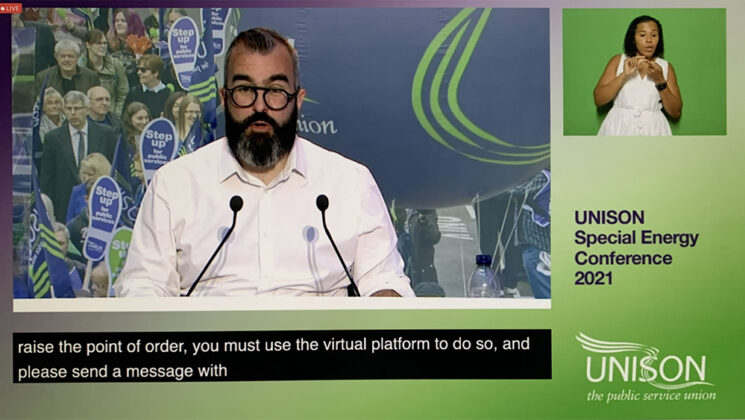UNISON’s energy service group today held the first UNISON conference to take place online. But after vice president James Anthony (pictured above) had explained this, delegates were more concerned with trying to make history of a different kind, with an agenda that was dominated by the struggles against climate change and for equality.
Angela Greenhalgh, the chair of the national energy committee, spoke briefly of the impact of COVID-19 on the sector, with the loss of jobs a serious concern. They were subjects that would come up throughout conference.
Ms Greenhalgh observed that there was a vital need “for new ways to recruit in a virtual world”.
Proposing the first motion to address the climate challenge, on behalf of the national committee, she said that the UK government’s plan to move to net zero by 2050 was an “ambitious target” and a welcome one – not least because of the intended creation of 250,000 jobs.
However, there seemed to be no strategy as to how these jobs would be filled, she said.
Ms Greenhalgh observed that with an increasing need for qualified workers in science, technology, engineering and mathematics (STEM) jobs, a campaign was needed to get rid of the idea that such courses and careers are not for women.
And there also needed to be work done to “educate consumers” to gain their “buy in” to greener energy.
Conference called on the national committee to undertake a range of work, including to:
- ensure that UNISON energy members’ jobs are put at the forefront of any debate around net zero emissions ;
- deliver “a just transition for all, not just a few”; and
- promote public ownership within the energy retail and supply space, using the levers this would bring to win the hearts and minds of all consumers in the UK [to] deliver net zero in people’s homes and improve the working terms and conditions for energy members.
Addressing the skill gap
A further motion looked at how, given the changes required in the sector to address climate change, no worker should be left stranded by the move to decarbonise.
Dawn Wainwright from EDF Doxford pointed out that “skill gaps are already happening” and there must be proper vocational training and reskilling in order for just transition that involves social inclusion and decent work.
“Millions of fossil fuel workers will need to find new jobs if the transition is not just,” she said.
Tracey Wainwright for the executive said that tackling climate change was about “our future and our children’s children.”
But she too raised the concern that, while renewables are growing, those in the traditional energy workforce were not being given the opportunity to be retrained to work in greener energy.
Conference called on the committee to:
- work with UNISON’s Labour Link to ensure a commitment to green job skills and training through Labour energy policy;
- ask UNISON energy branches to work with employers through negotiation to ensure upskilling and training in green skills and jobs.
A third motion was introduced for the service group executive by vice chair Lindsay McNaught, the vice chair of the executive committee and branch secretary of gas branch Scotland, who stressed how the changing nature of the sector – combined with the pandemic – meant that the union needed to adapt in how it organised in the sector.
Maz Cotterill, from the Yorkshire and Humberside gas branch, added that the union’s self-organised groups could play an important role in organising, and suggested activists look at the LGBT+ group’s guide to online recruitment.
Discussing equalities

The rest of conference was dominated by issues around equalities.
Tansaim Hussain-Gul (pictured above) from Cymru/Wales and South Gas, and co-chair of the national disabled members committee, explained that coronavirus had seen “energy companies having to start that journey” towards greater equality.
In many cases, allowing disabled members to work from home had improved productivity and reduced sickness leave.
Conference backed the call for the service group to work with employers in establishing working from home as a reasonable adjustment.
Claire Aylwin from South East Energy introduced a motion from the national disabled members’ committee touching on similar themes – primarily around access to other reasonable adjustments.
First-time delegate Michael Moore, from Npower in Yorkshire and Humberside, was another who spoke about the need to work with employers to “make the job market more accessible” and increase flexibility – while putting an end to working from home being seen as a “perk” for those in more senior jobs.
Speaking on behalf of the national women’s committee, Alice Bremner Watt from Gas Branch Scotland highlighted the inequality of the continuing gender pay gap across society – including within energy.
For the national Black members’ committee, Patrick Chung Yu from the community and voluntary sector branch, Northern Ireland, said that there was “a long way to go” in tackling inequality and racism, but the union knew what it had to do.
Michael Melia from North West Gas, speaking for the LGBT+ group, noted that some employers had used the pandemic as an excuse to view equality issues as a ‘luxury’ – and stressed the need for it to remain at the heart of everything UNISON does.

